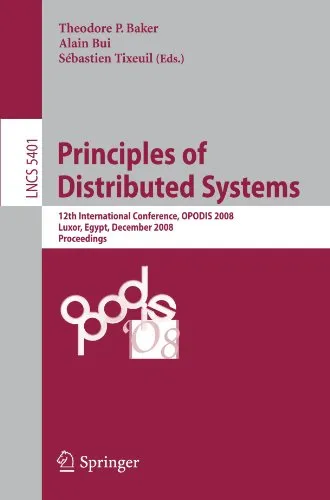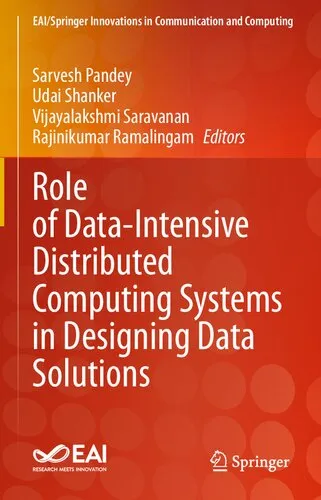Principles of Distributed Systems: 12th International Conference, OPODIS 2008, Luxor, Egypt, December 15-18, 2008. Proceedings
4.0
بر اساس نظر کاربران

شما میتونید سوالاتتون در باره کتاب رو از هوش مصنوعیش بعد از ورود بپرسید
هر دانلود یا پرسش از هوش مصنوعی 2 امتیاز لازم دارد، برای بدست آوردن امتیاز رایگان، به صفحه ی راهنمای امتیازات سر بزنید و یک سری کار ارزشمند انجام بدینکتاب های مرتبط:
معرفی کتاب "Principles of Distributed Systems"
کتاب Principles of Distributed Systems: 12th International Conference, OPODIS 2008, Luxor, Egypt, December 15-18, 2008. Proceedings مجموعهای از مقالات و پژوهشهای ارائه شده در دوازدهمین کنفرانس بینالمللی سیستمهای توزیعشده (OPODIS) است. این کنفرانس که در شهر تاریخی لوکسور، مصر برگزار شده، مکانی برای گردهمایی محققان، دانشجویان، و متخصصانی بود که در زمینه سیستمهای توزیعشده فعالیت میکنند. این مجموعه نمایانگر دستاوردهای علمی و تکنیکی مهم در این حوزه است و شامل مباحثی از جمله الگوریتمها، پروتکلها، و چارچوبهای نوین در سیستمهای توزیعشده میباشد.
خلاصهای از کتاب
این کتاب مجموعهای از مقالات داوریشده است که در کنفرانس OPODIS 2008 ارائه شدهاند. مباحث مطرح شده در این کتاب شامل طیفی وسیع از موضوعات پیشرفته در سیستمهای توزیعشده هستند، از جمله:
- طراحی و پیادهسازی الگوریتمهای توزیعشده
- پروتکلهای ارتباطی کارآمد برای شبکههای توزیعشده
- Fault Tolerance و مقابله با خطا در سیستمهای توزیعشده
- کاربرد سیستمهای توزیعشده در Cloud Computing
- مدلسازی رسمی و تحلیل رفتار سیستمهای توزیعشده
هر یک از مقالات این مجموعه، با در نظر گرفتن چالشها و راهحلهای جدید، دریچهای نوین به تحقیقات و پیشرفتهای علمی این حوزه ارائه میدهند.
نکات کلیدی کتاب
از نکات کلیدی که در این کتاب به آن پرداخته شده میتوان به موضوعات زیر اشاره کرد:
- ✓ اهمیت Consistency و Availability در Distributed Systems
- ✓ استفاده از مدلهای Probabilistic در تحلیل سیستمها
- ✓ نقش Synchronization در بهبود Performance
- ✓ راهکارهای نوآورانه برای Scalability در شبکههای توزیعشده
مطالعه این کتاب برای تمامی علاقهمندان به طراحی و اجرای سیستمهای پیچیده و کارآمد ضروری به نظر میرسد.
جملات معروف از کتاب
"In distributed systems, the challenge is not only the correctness of algorithms but also their adaptability to failure."
"Synchronization and resilience are not opposing goals; they are the twin pillars of reliable distributed computation."
چرا این کتاب اهمیت دارد
کتاب Principles of Distributed Systems به دلیل چندین ویژگی منحصربهفرد اهمیت دارد:
- ارائه جدیدترین پژوهشها و نوآوریهای علمی در حوزه سیستمهای توزیعشده
- مناسب برای محققان علمی، مهندسین نرمافزار، و دانشجویان مقاطع تحصیلات تکمیلی
- بررسی دقیق مشکلات واقعی مانند Fault Tolerance و Resource Allocation
- ارتباط مسائل تئوری با کاربردهای عملی، مانند Cloud Computing و Edge Computing
این کتاب نه تنها مشوق توسعهدهندگان فناوریهای توزیعشده برای حل مسائل چالشبرانگیز است، بلکه منبعی ارزشمند برای بینالمللی کردن تحقیقات در این زمینه محسوب میشود. با توجه به پیشرفتهای بیوقفه در حوزه Distributed Systems، مطالعه این کتاب برای درک عمیقتر و رسیدن به راهکارهای هوشمند ضروری است.
Introduction
Principles of Distributed Systems: 12th International Conference, OPODIS 2008, Luxor, Egypt, December 15-18, 2008. Proceedings is an in-depth exploration of groundbreaking research presented at OPODIS, a renowned international forum for the study of distributed computing systems. This book consolidates contributions from academics and professionals worldwide, focusing on the latest advances in distributed systems and algorithms, fault tolerance, network protocols, and system performance.
As distributed computing has become an integral part of modern technological infrastructures, this book serves as a critical resource for academics, students, and engineers to understand core principles and modern challenges. Covering a diversity of topics such as synchronization, consistency, and security, it delves into key problems and innovative solutions pertaining to highly decentralized network environments and applications.
Edited by Rachid Guerraoui, Theodore P. Baker, Alain Bui, and Sébastien Tixeuil, the proceedings of OPODIS 2008 provide a crucial platform to sift through leading-edge research in distributed systems, encapsulating contributions that address both theoretical foundations and practical implications. The book’s relevance extends to both researchers seeking a deeper theoretical understanding and practitioners aiming to resolve current system-level challenges.
Detailed Summary of the Book
At its core, the book offers insights into the principles governing distributed systems, accompanied by real-world case studies, experimental results, and innovative approaches to solving the inherent complexities of distributed environments.
The proceedings consist of papers that delve into various facets of distributed computing, including fault-tolerant systems, message passing, replication techniques, and system recovery. Key highlights involve the study of algorithms optimized for resource efficiency, discussions on minimizing latency in distributed networks, and robustness in the face of hardware or software failures.
Several sessions centered on synchronization challenges, data consistency models, and strategies for securing large-scale systems against malicious attacks. These themes have immediate relevance given the growing reliance on distributed systems in domains ranging from cloud computing to IoT-based ecosystems. Additionally, the conference explored advancements in distributed coordination mechanisms, emphasizing the role of algorithms in coping with the challenges of scalability and efficiency.
A unique feature of the book lies in its balance between theoretical research and application-oriented contributions. From mathematical modeling of distributed protocols to studying their implementation in real-world settings, this publication provides a comprehensive outlook for readers seeking to grasp the multifaceted nature of distributed systems design and development.
Key Takeaways
- An in-depth understanding of fundamental principles in distributed computing and their evolution over time.
- Exposure to state-of-the-art algorithms and methodologies aimed at improving the efficiency and reliability of distributed systems.
- A critical assessment of the challenges posed by modern distributed environments, such as scalability, fault tolerance, and communication overheads.
- Insights into solutions addressing synchronization issues, consensus protocols, and secure communication strategies.
- A glimpse into future trends and research directions in distributed systems, ensuring relevance to ongoing academic and industrial pursuits.
Famous Quotes from the Book
"Distributed systems do not eliminate the challenges of complexity; they merely distribute them across space and time."
"The strength of a distributed system lies not in its individual nodes but in the resilience and adaptability of its collective architecture."
Why This Book Matters
In an increasingly interconnected world, where distributed systems govern everything from social media platforms to critical infrastructure, the importance of understanding their underlying principles cannot be overstated.
This book captures not only the technical aspects of distributed computing but also the philosophical challenges of designing systems that are robust, efficient, and secure. By focusing on both theoretical and practical dimensions, it equips readers with the tools and knowledge to tackle modern distributed computation problems while encouraging them to contribute to the field's evolution.
Furthermore, the proceedings from OPODIS 2008 reflect the collaborative and interdisciplinary spirit of the international research community, demonstrating the value of global academic discourse in addressing shared technological challenges. Whether you're a student, a seasoned researcher, or a practitioner, this book lays the groundwork for insightful contributions and innovative solutions within the realm of distributed systems.
دانلود رایگان مستقیم
شما میتونید سوالاتتون در باره کتاب رو از هوش مصنوعیش بعد از ورود بپرسید
دسترسی به کتابها از طریق پلتفرمهای قانونی و کتابخانههای عمومی نه تنها از حقوق نویسندگان و ناشران حمایت میکند، بلکه به پایداری فرهنگ کتابخوانی نیز کمک میرساند. پیش از دانلود، لحظهای به بررسی این گزینهها فکر کنید.
این کتاب رو در پلتفرم های دیگه ببینید
WorldCat به شما کمک میکنه تا کتاب ها رو در کتابخانه های سراسر دنیا پیدا کنید
امتیازها، نظرات تخصصی و صحبت ها درباره کتاب را در Goodreads ببینید
کتابهای کمیاب یا دست دوم را در AbeBooks پیدا کنید و بخرید
1212
بازدید4.0
امتیاز50
نظر98%
رضایتنظرات:
4.0
بر اساس 0 نظر کاربران
"کیفیت چاپ عالی بود، خیلی راضیام"
Questions & Answers
Ask questions about this book or help others by answering
No questions yet. Be the first to ask!



